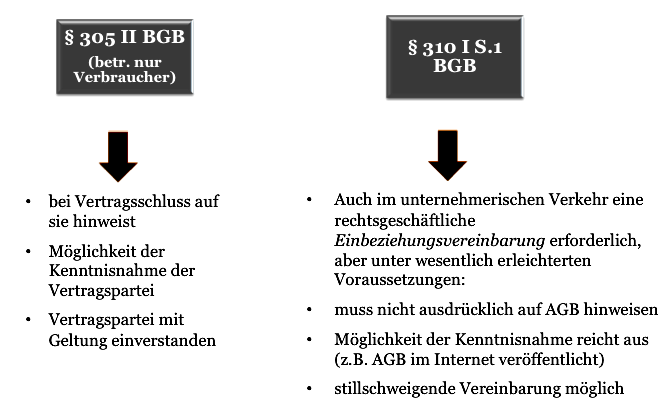LEGAL+ NEWS
General terms and conditions (GTC) affect everyone: whether commercial enterprises, which try to make their respective GTC the basis of the business relationship in their business dealings with each other, or private individuals, who are confronted with GTC in every situation in life – for example when boarding public transport, shopping on eBay or amazon or even when entering a department store. The importance of general terms and conditions is therefore immense.
With this in mind, I would like to try to provide a brief overview of this extremely important topic in this article:
What are general terms and conditions?
Sections 305 et seq. of the German Civil Code (BGB) contain regulations on general terms and conditions:
In detail:
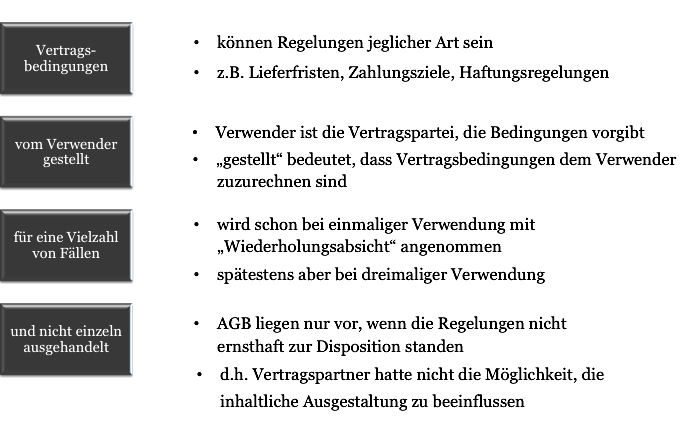
Why General Terms and Conditions?
AGB are mainly used for the following reasons:
- Simplification of the business process (e.g. reduction of the time required to negotiate the contract)
- GTC create uniform and detailed regulations for legal relationships in mass contracts (simplification of legal transactions)
- make it possible to further develop inappropriate laws through new regulations or to concretize undefined legal terms (e.g. if the law states a “reasonable” period, this can be precisely defined in the GTC)
- Often even indispensable if there are no statutory regulations for the type of contract
- Strengthen your own legal position in relation to the respective contractual partner
Inclusion of general terms and conditions
In order to be effective at all, general terms and conditions must be effectively included in a contractual relationship:
Limits of admissibility (content control) of general terms and conditions
The user cannot make unlimited provisions (in his favor) in the GTC. The law provides for very specific prohibitions of regulation in this regard, particularly when used in relation to consumers. However, T&Cs between entrepreneurs are also subject to a so-called content review, in particular the prohibition of unreasonable disadvantage to the contractual partner also applies here. The following chart provides an overview:
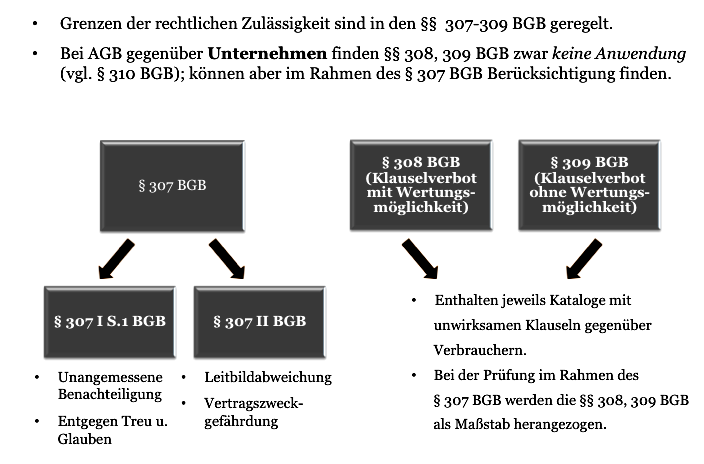
Accordingly, the following principles in particular apply to the limits of the admissibility of GTC:
§ Section 307 I sentence 2 BGB Transparency requirement
= According to this, an unreasonable disadvantage to the customer can also result from the fact that a GTC clause is not clear and comprehensible
§ 305 c BGB surprising clauses
= GTC clauses are not part of the contract if they are “so unusual that the user’s contractual partner need not expect them”
§ 305 b BGB individual contractual agreements take precedence over the GTC
= Individual agreements between the parties shall always take precedence. GTCs that conflict with such individual agreements have no effect.

Conflict of general terms and conditions
In business transactions between entrepreneurs, it is more the rule than the exception that both parties attempt to make their respective GTCs an integral part of the contract. The question then arises, particularly in the event of conflicting provisions, as to what should then apply. The following diagram illustrates the case where neither party has considered the possibility of such a conflict in their respective GTCs:
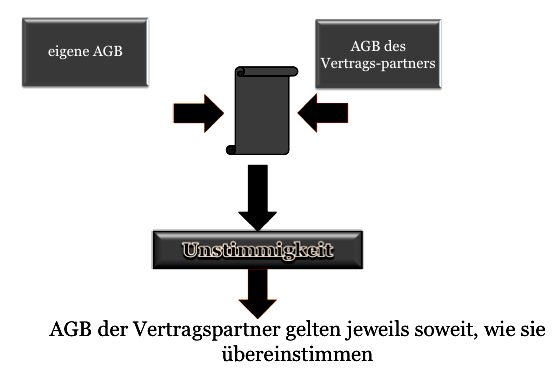
The situation is different if so-called defense clauses are used:
Defense clause: “These General Terms and Conditions of Purchase (Terms and Conditions of Purchase) shall apply exclusively; deviating, conflicting or supplementary General Terms and Conditions of the Supplier shall only become part of the contract if and to the extent that the Purchaser has expressly agreed to their validity in writing. This requirement of consent shall also apply if the Purchaser accepts the Supplier’s services without reservation in the knowledge of the Supplier’s General Terms and Conditions of Business .”
In the event that one or both parties have included a so-called defense clause in their GTC, the following applies:
Variant 1 (one party has included a defense clause)
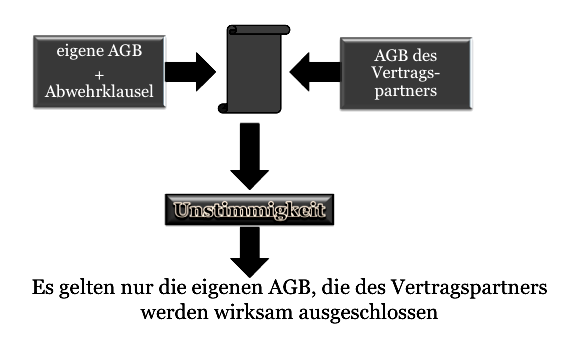
Variant 2 (both parties have included a defense clause)
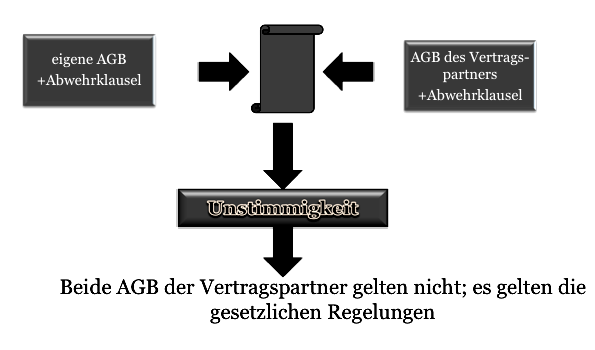

LATEST ARTICLES

Guide to GmbH law: The duties and liability risks of the managing director of a GmbH
In the external relationship, only the GmbH is liable, which can indemnify its managing directors. However, this does not mean that external liability of the managing directors is excluded.
In addition to personal liability in the area of tax and social security law, the managing director may also be liable on the basis of his own contractual obligations, on the basis of an induced legal appearance, on the basis of (personal) culpability when concluding the contract and in tort.
For the aforementioned reasons, every managing director of a GmbH is urgently recommended to be familiar with the requirements for proper managing director activities.

Estimation of fictitious defect rectification costs
For some time now, a landmark decision by the Federal Court of Justice has clarified that the contractual claim for damages in lieu of performance pursuant to Sections 437 No. 3, 280, 281 BGB can be assessed on the basis of the “fictitious” defect rectification costs that are likely to be necessary but have not yet been incurred, see BGH ruling of 12.03.2021, Ref. V ZR 33/19. In practice, it is of particular relevance how the court called upon to decide in an individual case is to determine the amount of such fictitious damage costs.

EUGH ruling “LKW Walter”
The possibility of being able to enforce one’s own rights as easily and quickly as possible in cross-border EU business transactions, which is very welcome in principle, has some pitfalls. The author’s experience shows that traders are often overwhelmed when they receive legally relevant mail from abroad. This is not least due to the fact that court documents received from abroad often do not meet the requirements of European law.
CONTACT

+49 (40) 57199 74 80
+49 (170) 1203 74 0
Neuer Wall 61 D-20354 Hamburg
kontakt@legal-plus.eu
Benefit from my active network!
I look forward to our networking.
This post is also available in: DE
